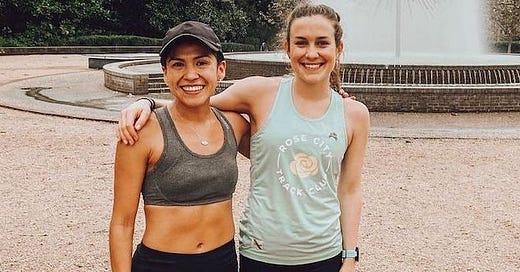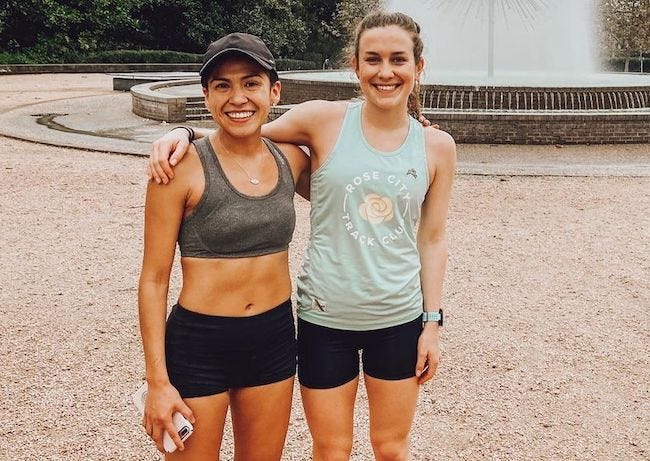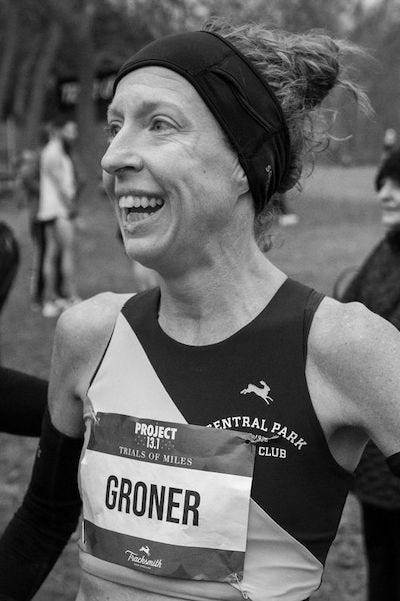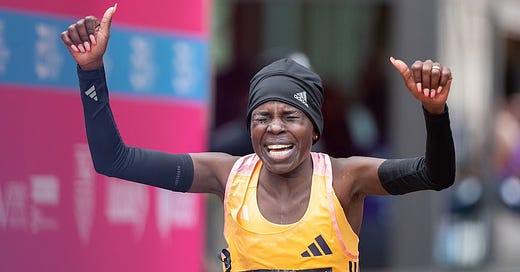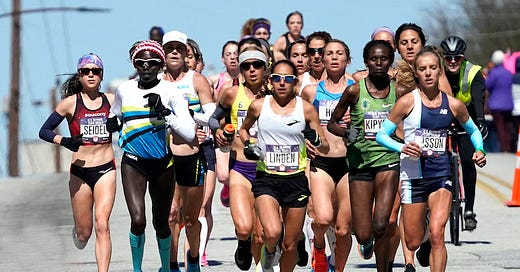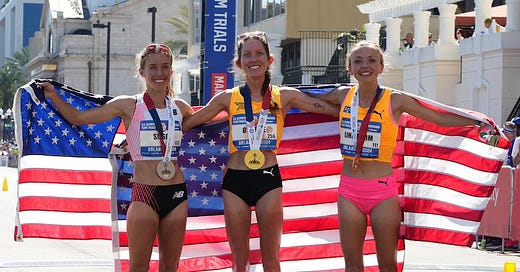

Discover more from Fast Women
Issue 229, presented by PUMA
When it comes to Trials qualifying, there’s strength in numbers
In December 2021, USATF announced that the qualifying standard for the 2024 U.S. Olympic Marathon Trials would be 2:37:00, an eight-minute drop from the 2020 standard. In 2020, 511 women qualified for the Trials. It was clear that the 2024 Trials would be significantly smaller. The question was how much smaller.
The qualifying window has been open for nearly 15 months now, and to date, 113 women have hit the marathon or half marathon standard (1:12:00). With each passing race, it’s apparent the field will be much smaller than 2020’s field. The standards are tough. But whether or not they earn a spot on the starting line on February 3, 2024 in Orlando, hundreds of women continue to plug away at the goal—and they’re finding community in the effort.
One of those women is Lauren Ross, of Portland, Oregon. Ross, a 2:43 marathoner, missed qualifying for the 2020 Trials by 34 seconds, and she’s giving it another shot this time around. “I think a huge draw of the OTQ and the sport of running itself, for me, is the social aspect of it,” she told Fast Women.
I reached out to Ross and Starla Garcia of Houston shortly after they hosted a shakeout run for Trials hopefuls, in conjunction with January’s Houston Marathon. They’ve approached Trials qualifying as a team effort. They want to make it to Orlando, and they want to bring as many other women as possible with them.
Garcia, a 2020 Trials qualifier, felt the camaraderie in the last cycle and wanted to keep the momentum going this time around. “When we got to the Trials, it was like we had these built-in friendships already and you hadn’t even met them yet,” Garcia said. “But you felt so connected to what they did and understood everything that they went through… I think when the new standard came out, everyone was like, ‘Who’s game?’”
Garcia and Ross say this is a pursuit with many different leaders, and those interested in working together tend to find one another using hashtags, via Strava, and there’s even a small Facebook group for those going after the OTQ. They use those tools to help coordinate where they’ll race next and occasionally trade tips.
Not only is the community aspect fun, Ross finds that it helps her run faster. “I really thrive on the energy of the group,” she said. “Having a lot of people together and being able to turn off your brain and trust that the group is running what you need to run, that is huge. It’s really, really difficult to be super mentally sharp for two and a half hours.”
Some men are helping. One of them, Rick Powell, has centered his recent racing schedule around pacing women aiming to hit the standard. He even created an Instagram account to spread the word. He’s not quite fast enough to hit an OTQ time of his own, nor is he a U.S. citizen. But he has carved out a niche helping others. “These women have done thousands of miles to get to that point,” he said. “To help them achieve a once-in-a-lifetime goal is absolutely worth it. I’ll do this until my legs fall off.”
Forty-three of the 112 qualifiers achieved their OTQ time at the 2022 California International Marathon (CIM) in Sacramento, which has a fast course and relatively reliable weather. (Some of the events that should have produced a bunch of qualifiers have been a flop weather-wise.) CIM is on December 3 this year, only two days before the qualifying window closes, and many runners don’t want to leave it until that late.
That has put a lot of weight on Grandma’s Marathon, held in Duluth, Minnesota, in June, which has a fast course. Summer racing can be hot, but because the course and town are along Lake Superior, the weather tends to be significantly cooler. Last year the conditions were excellent.
Sarah Culver, the race’s elite athlete director, said the elite and sub-elite fields filled faster than ever this year. She told athletes to contact her after January 1, and she heard from about 400 of them within a week. When I talked to her a couple weeks later, she already had 100 athletes in the women’s elite field and 100 more in the semi-elite field. Others were still welcome to enter the race, but they wouldn’t get elite status. (The race has since sold out.) Only the top 40 women get bottle support (fluids of their choosing, available at fixed intervals) on the course.
Getting a preferred spot in the fastest races can be tough, and that’s part of the reason Heather Knight Pech and James McKirdy have created the McKirdy Micro - On the Cusp Marathon, which will take place October 14, 2023, at New York’s Rockland Lake State Park. It will compete with more established fall marathons for runners, but it’s a flat course, the race starts early in the morning, and every accepted runner will get personal fluids. (The event doesn’t have a website yet, but you can reach out to james@mckirdytrained.com for more information.)
Regardless of how many women run sub-2:37, the goal is helping many women run faster times than they previously thought were possible. Both Garcia and Ross understand that this chase is as much about the journey as anything else. Garcia had a tough day in Houston this year—many people did, due to the heat and humidity. “I really hope a lot of people at the race saw people like me going for it, not doing it, and being okay with it,” she said. “I saw a lot of young Latina girls handing out water and cheering. I hope they saw that at least I put myself out there.”
Thanks to PUMA for sponsoring Fast Women this month!
I’m excited to share information about two PUMA shakeout runs taking place during Boston Marathon weekend. And the first 10 people to contact me and say they will be attending one of these events will receive an exclusive T-shirt. (You can just reply to this message.)
The PUMA FOREVER.FASTER Shakeout Run
When: Saturday April 15, 2023, 2:00–4:00 p.m. ET
Location: Fielder Field on Charles River Esplanade
Who: All are welcome! Special guests will include PUMA athletes and running community leaders
What: Easy 2- or 4-mile run, PUMA running shoe try ons, recovery zone, pro athlete meet and greet, giveaways, fun snacks and drinks
PUMA Running and Marathon Sports Community Run
When: Sunday April 16, 2023, 9:00–11:00 a.m. ET
Location: Marathon Sports Store - 671 Boylston St, Boston (Right at the finish line!)
Who: All are welcome! Special guests will include PUMA athletes and running community leaders
What: Easy 2.5-mile run, PUMA running shoe try ons, pro athlete meet and greet, giveaways, fun snacks and drinks
Camille Herron smashes the 48-hour world record
Starting on Friday, Camille Herron covered 435.336 kilometers/270.505 miles and broke the 48-hour world record at Australia’s Sri Chinmoy 48-Hour Festival. She averaged 10:38/mile for two days straight. Heron surpassed the previous record (411.458K/255.668 miles, set by the UK’s Joasia Zakrzewski last month) around 45 hours, 7 minutes into her run, with nearly three more hours of running to go. She improved the record by a whopping 23.878K, which is 14.837 miles.
Herron, 41, is known for her impressive endurance feats, but this was the farthest she has ever run. She moved to third on the all-time 48-hour list, behind only Yiannis Kouros and Andrii Tkachuk. Herron also surpassed the men’s American record. The race was held on a 400m track and the runners switched their direction every four hours. The weather varied throughout, but it poured rain at times.
Herron intentionally started out at a quicker pace, because she felt it made the most sense strategy-wise, but she was also hoping that her first half split would be fast enough to earn her a spot on the U.S. team for the World 24-Hour Championships at the end of the year. (As of now, it is.) Herron also said that she was dedicating the race to her father, who was going through a health struggle and would be having surgery during the race. (Results)
Roberta Groner sets an American masters record
On Saturday morning at New York’s Rockland Lake State Park, Trials of Miles hosted Project 13.1, with the hope of helping people qualify for the U.S. Olympic Marathon Trials, or hit other goal times. Roberta Groner, 45, didn’t need a Trials qualifier; she qualified by running 2:32:02 at the 2022 Houston Marathon. But she was going after another goal: Linda Somers Smith’s American 45–49 age-group record of 1:13:32, set in 2010.
Groner smashed the record, finishing third overall in 1:11:34 (chip time 1:11:28), behind Jacqueline Gaughan (1:11:23) and Canada’s Anne-Marie Comeau (1:11:30). Side note: There was a sizable gun/chip time discrepancy for the women, because they started at the back. USATF accepts chip times for masters records, so Groner won’t lose six seconds. “I’m getting back/relearning to race the way I love to do it!” she wrote on Instagram, noting that she started in control and progressively got faster. Groner will run the Copenhagen Marathon on May 14.
The women’s race produced one new Olympic Marathon Trials qualifier. Running her first half marathon, Grace Moore finished fourth in 1:11:53 (1:11:48 chip time). Moore was a 15:47 5,000m runner when she was at Temple University, and she finished her eligibility in 2021. She wrote a nice Instagram post about her qualifying run. (Results)
Get to know the PUMA athletes running the Boston Marathon
(This section is sponsored by PUMA)
Edna Kiplagat
Won the 2017 and 2021 Boston Marathons
Was the oldest person ever to win a World Marathon Major (at 41).
Has been known to celebrate her success with an elaborate British afternoon tea with friends. (She doesn’t drink alcohol.)
Has five children.
Race day shoe: TBD
Favorite part of the Boston course: “I like the final five miles from the top of the hill [at Boston College],” she said. “You can run fast from there to the finish line on Boylston Street. There are many fans the rest of the way, and I have confidence that I can compete well in these final miles.”
Annie Frisbie
Finished seventh (2:26:18) at the NYC Marathon in her debut
Has a mini poodle named Billie
Has an irrational fear of being late to the airport
Has been craving pineapple during marathon training
Race day shoe: Puma Deviate NITRO Elite 2
Favorite part of the Boston course: This is her Boston debut.
Dakotah Lindwurm
Won the 2022 Grandma’s Marathon in 2:25:01
Is known for smiling her way through races
Has been a pescatarian for 12 years
Is deathly afraid of any and all turtles
Race day shoe: Puma Deviate NITRO Elite 2
Favorite part of the Boston course: Wellesley College. “People aren't joking when they say you can hear it before you can see it,” she said.
Sara Vaughn
Has a marathon best of 2:26:23
Started her athletic career as a gymnast
Has four children
Race day shoe: Puma Deviate NITRO Elite 2 or Fast-R NITRO Elite
Favorite Part of the Boston course: There was a short, quiet section by a cemetery, and she appreciated the chance to regroup. She also loved Boylston Street. “I was having such a bad day last year, but the crowds there made me feel like I was winning!” she said.
Other News and Links
I thought both of these “as told to” articles, one by Canada’s Lucia Stafford and the other by Japan’s Nozomi Tanaka, were excellent reads.
Elite runners told Swedish Radio that men in power are demanding sex in exchange for racing opportunities and access to coaching. Mary Keitany says she was subject to these pressures starting when she was 16. (This is part of the reason Mary Ngugi started the Nala Track Club.) And another article from the same series is critical of Agnes Tirop’s former agent, Gianni Demadonna, for not doing more before her murder. His response? “I am not a Samaritan. I am not the Red Cross. I mean I am doing business. If I don’t deal with that woman or that athlete, somebody else will come and will deal.” I hope he has more empathy than it seems, and it was lost somewhere in translation.
World Athletics announced on Thursday that it has tightened the restrictions for athletes with differences in sex development (DSD), which is likely to end the careers of DSD athletes currently competing at the professional level. Previously, World Athletics’ policy applied only to athletes competing in distances from 400m to the mile. But going forward, it applies across all events. And the maximum testosterone levels for DSD athletes have also been reduced. It breaks my heart to think about athletes who love track & field and are really good at it, but they’re told they don’t count as women. Christine Mboma’s coach said he was shocked by the news, and that they will consider taking legal action.
At the same time, World Athletics also announced that transgender athletes who have gone through male puberty would no longer be able to compete in the female category in World Rankings competition. As many have pointed out, the changes go into effect on March 31, International Transgender Day of Visibility. While saying they wanted to “protect the female category,” World Athletics admitted that there are currently no transgender athletes competing internationally in track & field, which makes the entire debate seem like a lot of fuss and ugliness about a non-issue. But now that World Athletics has created such a policy, it will make it easier for those at other levels of the sport (and other sports) to make rules that exclude trans women. I fully understand that there are biological advantages at play here, and I’m unaware of any perfect solutions, but I wish more of the discussion centered around how to create opportunities for trans athletes, rather than how to “protect” women from them. Katie Barnes has an interesting-looking book on how sports shape the gender debates coming out in September. “We’re not saying no forever,” World Athletics president Sebastian Coe told the BBC, and I think this debate is going to rage on.
Phily Bowden, a professional runner for Great Britain, has done an excellent job of using YouTube to tell her story and help others learn about running. Her latest video, about her struggles during her time running for the University of Oregon, is one of her most popular yet.
You might need an Apple device for this link to work, but Runner’s World published a revealing excerpt from Des Linden’s upcoming book. (Skip if you don’t want spoilers.)
Rachel Kraus wrote a really good article about synching workouts to one’s menstrual cycle, and whether the practice makes sense.
Steph Bruce and Ben Rosario have written a book. Follow Your Heart: The Story of Stephanie Bruce’s Not-So-Final Season is out now. You can get an autographed copy here or get it on Amazon/Kindle here.
Jessica Watychowicz, who won the 2022 Twin Cities Marathon, announced that she has signed with Adidas. (And then she finished second at the Chicago’s Shamrock Shuffle 8K on Sunday, running 26:42, seven seconds behind Sarah Disanza.)
This is a good Runner’s World article about Devon Yanko, who continues to run at an elite level despite having lupus.
I’ve been loving the updates coming from Formula Kersee, Bobby Kersee’s training group that includes Sydney McLaughlin and Athing Mu, via their new Instagram account, and now Team Boss is on Instagram as well.
The Boston Globe published an update on the case of former Wellesley College coach John Babington, who was banned by SafeSport. College officials say they recently met with the student who brought forward claims against him, and that since the ’90s, they’ve taken steps to prevent sexual misconduct.
Additional Results
Annie Rodenfels broke away from Emma Grace Hurley on the last hill on the course and went on to win the Atlanta Women’s 5K in 15:44. Hurley, the hometown favorite, finished second in 15:52, and Bethany Hasz finished third in 16:03. The pro race had an earlier start, and after she raced, Rodenfels offered words of advice to the masses before serving as the starter for their race. (Results | Race replay)
Coming off a fourth-place finish in the NCAA indoor mile, UVA’s Margot Appleton opened her outdoor season at Raleigh Relays, winning the 1500m in 4:08.96. She broke Michaela Meyer’s school record and lowered her PR by eight seconds. Runner-up Rylee Penn of Cincinnati ran 4:10.13 and shaved a whopping 23 seconds off her PR (though she ran a 4:34 mile indoors, so this didn’t come out of nowhere). NC State’s Allie Hays won the 10,000m in a school record of 32:21.13, and Notre Dame’s Olivia Markezich won the 5,000m in 15:33.62. Angel Piccirillo won the 800m in 2:02.75, and Butler’s Angelina Ellis won the steeplechase in 9:53.32. (Results)
Peru’s Kimberly Garcia set a world record of 2:37:44 in the 35K race walk (7:15/mile) at the Dudinska 50.
Lucy Scholz won The Speed Project solo race outright in record time, running roughly 300 miles from Los Angeles to Las Vegas in 84 hours, 45 minutes, supported by her all-female crew that provided many updates along the way. Braddy’s Lil’ Ponies, made up of members of the Mill City Running Race Team, won the relay event, running a new women’s record of 33 hours, 13 minutes.
Breanna Sieracki won Minnesota’s Hot Dash 5K in 16:22.
Podcast Highlights
This newsletter was getting long, but I didn’t want to skip the podcast section, because there were some good ones this week. You can see my podcast roundup, and the news that came from the episodes, here.
Something that made me smile
I enjoyed watching Molly Seidel win her most recent race. (This is totally clickbait, but at least it’s amusing clickbait.)
Upcoming
The USATF 10 Mile Championships, hosted by the Cherry Blossom 10 Mile, takes place on Sunday. The race features a strong field, and it will be streamed live on USATF.tv (subscription required) starting at 7:10 a.m. ET.
Thanks again to PUMA for sponsoring Fast Women in March, and to all of you who make this newsletter possible through your support on Venmo and Patreon.
Have a great week!
Alison


